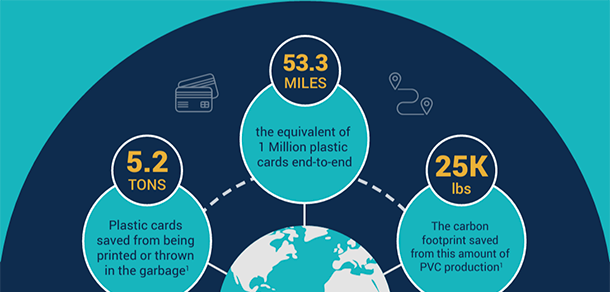
Transact details how digital IDs reduce carbon footprint, keep tons of plastic out of landfills and oceans
There is little argument that mobile credentials are cool and convenient, but are they also environmentally conscious? According to mobile credential pioneer Transact, they both reduce carbon emissions and keep toxins out of our oceans and landfills.
In recognition of Campus Sustainability Month, let’s see how our ID cards and credentials impact the planet.
In a 2020 study, the International Card Manufacturers Association reported that more than 37 billion plastic cards were produced worldwide.
It’s important for all our departments to work together to reach UNB’s sustainability goals. The mobile credential plays its part by reducing the use of plastic cards
Traditional ID cards are made of plastic, most made of Polyvinyl Chloride (PVC). PVC utilizes and both petroleum and chlorine, two environmentally harmful substances.

But the lifecycle of an ID card has negative environmental impacts at multiple stages.
The production process involves mining and shipping of chemicals; energy is required to generate the raw plastic and the finished card; and transport of the cardstock to resellers and end users also is a source for carbon emissions.
The lifespan of an ID card is limited. Payment cards and IDs often expire after just a few years. Card recycling is minimal due to limitations on collection and complicated processing. The vast majority will break down over the next 1000 years in landfills and oceans.
Transact is proud of the positive contributions its mobile credential is making to sustainability. In a recent article, statistics demonstrate this positive impact:
Transact partner, University of New Brunswick, embarked on a comprehensive approach to sustainability. In 2021, UNB launched Mobile Credential as a part of its green initiative.
According to Melissa Hannah, Director of IT Services, “It’s important for all our departments to work together to reach UNB’s sustainability goals. The UCard can play its part by reducing the use of plastic cards and the mobile credential is one way we could do that.”
To learn more about UNB’s efforts and the green side of mobile credentials, check out Green is the new plastic: Switch to Transact Mobile Credential for a sustainable campus experience.




